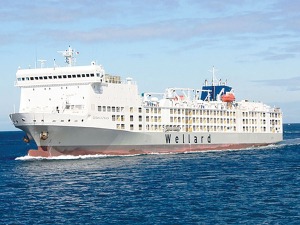Full cabinet
OPINION: Legislation being drafted to bring back the controversial trade of live animal exports by sea is getting stuck in the cogs of Cabinet.
 Under a reinstated live export programme LENZ is pushing for a ‘Gold Standard’ for the export of livestock from New Zealand.
Under a reinstated live export programme LENZ is pushing for a ‘Gold Standard’ for the export of livestock from New Zealand.
Live Export NZ (LENZ), the industry group behind reinstating live exports, says that in 2020 New Zealand exported $255.89 million of live cattle to the rest of the world.
“Live exports have made up roughly 0.2% of all agriculture revenue since 2015. In the past 10 years, around 5000 farmers across New Zealand have supplied breeding cattle for export, with an average of over 40 animals per farm.”
LENZ claims that additional to the livestock value farmers receive directly, a shipment of around 3000 animals can return roughly $1.5 million to New Zealand based service providers – including domestic livestock transporters, veterinarians, feed supply companies, quarantine facilities and regional accommodation providers.
“It’s the rural areas and rural service centres that see most of the economic benefits from the trade as this additional income circulates creating an economic multiplier effect.”
It adds that livestock for export usually attract a premium.
“This can be 50-85% of an animal’s value above the domestic market. Selling livestock for export is a useful income generator for rural communities.”
Under a reinstate live export programme LENZ is pushing for a ‘Gold Standard’ for the export of livestock from New Zealand.
“The Gold Standard system takes export welfare to a level unmatched internationally and contributes to New Zealand’s position as a premium producer of sustainable and ethically produced agriculture.”
LENZ adds that shipping under the Gold Standard will mean:
Fonterra’s impending exit from the Australian dairy industry is a major event but the story doesn’t change too much for farmers.
Expect greater collaboration between Massey University’s school of Agriculture and Environment and Ireland’s leading agriculture university, the University College of Dublin (UCD), in the future.
A partnership between Torere Macadamias Ltd and the Riddet Institute aims to unlock value from macadamia nuts while growing the next generation of Māori agribusiness researchers.
A new partnership between Dairy Women’s Network (DWN) and NZAgbiz aims to make evidence-based calf rearing practices accessible to all farm teams.
Despite some trying circumstances recently, the cherry season looks set to emerge on top of things.
Changed logos on shirts otherwise it will be business as usual when Fonterra’s consumer and related businesses are expected to change hands next month.

OPINION: Here w go: the election date is set for November 7 and the politicians are out of the gate…
OPINION: ECan data was released a few days ago showing Canterbury farmers have made “giant strides on environmental performance”.